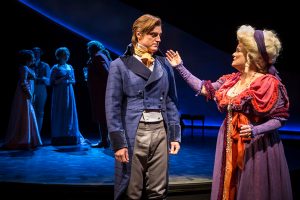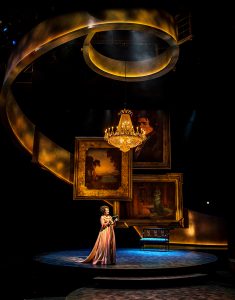A Polished Musical Turn at the Old Globe With Jane Austen

Megan McGinnis, left, and Sharon Rietkerk in Sense and Sensibility at the Old Globe Theatre. Liz Lauren Photos
In the literary world, Jane Austen can do no wrong. Her bright cascade of conversation, her neatly stacked insights and her sure steerage of incident in six major novels have won the affection of readers and writers for two centuries.
And she hasn’t done badly on stage or screen, either. Versions abound. The Old Globe Theatre is back at her shelf with a new adaptation of Sense and Sensibility using words and music by Paul Gordon, who brought the Globe a dear version of Emma five years ago.
Watching Gordon’s deft handling of the Regency world around Elinor and Marianne Dashwood, I was struck again at how ordinary these people are. Somewhere, an underclass groaned and sweated and bore up to support all this languid frivolity but Austen’s subjects are mostly parasites: Landed gentry squabbling over inheritance and social standing.
Was it for such, then, that Nelson would triumph at Trafalgar and Wellington defeat Bonaparte at Waterloo? Well, yes. There’s a grand tradition of twits in British lit, from Wycherley through Sheridan to P.G. Wodehouse. Austen, in her generous compassion for all, just took them more seriously.
The Dashwood sisters, sensible Elinor and ebullient Marianne, must survive in a slippery world where legal technicalities put their income under the control of a weak-willed brother with a wife available as an evil step-mother in a fairy tale. A benevolent relative eases the sisters’ immediate economic strain. But the cumbersome social system, driven by baroque social honor codes that bind their class, discourages hope of spiritual survival amidst the growing swirl of the romantic era around them. They themselves are not twits, just sweet, clever girls who deserve the best. But they are surrounded and jostled mostly by self-centered idlers.
It’s fascinating to watch how Gordon has weeded the extravagant garden of characters without losing momentum. There’s just not room in two hours onstage for all Austen’s observed texture but the only really sparse moments come during crowd scenes at parties. And director Barbara Gaines usually has an elegant twist of stagecraft that covers well enough.
What remains is what’s most important, the trials and errors on the path to happiness for Elinor and Marianne and how compassion, integrity and time work their kind miracles.
Music inserted into an existing masterpiece faces stern demands. Lacking access to true collaboration, the needs of musical theatre – starting with “Break into song only when emotions begin to overload speech.” – dictate when and what to sing. Thus the requisite manifestos, usually delivered in operatic “park and bark” style, which suggests that the composer faced a job of work, not a burst of inspiration.

Sean Allan Krill and Paula Scrofano in Sense and Sensibility at the Old Globe Theatre. Liz Lauren Photo
Such is the case here, with a single glowing exception. Gordon pounced upon a Austenean phrase self-describing the older and more reserved of Marianne’s suitors, Colonel Brandon, as being “…on the wrong side of five and thirty…” and made a near show-stopping number out of it. Sean Allan Krill, who plays Brandon with grave reserve, throws into the song a wry lamentation all too familiar to anyone enthralled by youthful allure. He represents his generation, his sex and his art flawlessly.
The other principals are equally fetching in their roles if not quite as fortunate in the music assigned. Sharon Rietkerk is poised, serene and almost regal as Elinor and Wayne Alan Wilcox plays her preferred male with a winning combination of clumsy sincerity and feckless adoration. The two of them have found matching vocal styles that bridge two centuries between Austen’s hit parade and ours, and their blending abilities earn them a welcome second-act reprise.
Peter Saide, darkly handsome and extravagantly ardent, literally sweeps Marianne off her feet but Megan McGinnis is quite his match, even after his exposure as a contemptible cad. McGinnis often is called upon to extend the momentum of scenes, a task for which her spunky sparkle seems ideally suited.
Paula Scrofano and Brian Ray Norris play the beaming country relatives like game troupers; David Schlumpf and Jill Van Velzer as the pliable sibling and his scheming mate are breezily loathsome – “Why should I suffer the burden of their misfortune?” – and Emily Berman, leading with the show’s most aggressive bosom, is a marvel of compact avarice as the spanner in the works of Elinor’s happiness.
Ms. Berman’s costumes is an excellent example of Susan E. Mickey’s articulate designs, as are the candy-striped trousers of the country squire played by Norris and Saide’s voluminous dark cloak. Everybody is outfitted as who they are. The only mild regret is that they never seem to change clothes.
Kevin Depinet’s set is a curiosity, a giant art-deco curl that thrusts into the audience, apparently edged
with neon, that suggests a tiresome 1940s magazine illustration. Various fixtures, paintings and furniture bits fly in to help, and Donald Holder’s lighting is painterly and subtle but curious the set remains.
Ms. Gaines’ staging is fluid and concise, with one puzzling detail. When exiting, actors never look back. That doesn’t sound very important and, actually, it isn’t. But getting from center stage into the wings, past that deco thing, leaves plenty of time for an appraising look back, appropriate to such a polished product as this. Yet nobody does it.
So Gordon deserves highest marks for his libretto, an adaptation which calls no attention to itself but strives only to link the story and the audience. The songs, with the exception noted, are a predictable catalogue of inoffensive necessities, pleasant enough but too dependent on the Stephen Sondheim brand of mannered irony.
Laura Berquist presides effectively at the piano over an ensemble of nine colleagues that does not, repeat not, have a single electronic element. They could play this whole score right through a total power failure. The arrangements, by Larry Hochman, Bruce Coughlin and Curtis Moore, are luxuriously of the period and emphasize again the care with which this production was assembled by Ms. Gaines and the Chicago Shakespeare Theatre.
(Continues on the Shiley Stage at 7 p.m. Tuesdays, Wednesdays and Sundays; at 8 p.m. Thursdays-Saturdays; and at 2 p.m. Saturdays and Sundays through Aug. 14, 2016.)

Welton Jones has been following entertainment and the arts around for years, writing about them. Thirty-five of those years were spent at the UNION-TRIBUNE, the last decade was with SANDIEGO.COM.



